If a pointer stores the address of a variable ... then from where do we get the pointer?
What I asked was that if we are using pointer directly, then there must be a location from where we get this pointer?
If a pointer stores the address of a variable ... then from where do we get the pointer?
What I asked was that if we are using pointer directly, then there must be a location from where we get this pointer?
Yes, a declared pointer has its own location in memory.

In the example above, you have a variable, 'b', which stores the value "17".
int b = 17; /* the value of 'b' is stored at memory location 1462 */
When you create a pointer to that variable, the pointer is stored in its own memory location.
int *a;
a = &b; /* the pointer 'a' is stored at memory location 874 */
It is the compiler's job to know where to "get the pointer." When your source code refers to the pointer 'a', the compiler translates it into -> "whatever address value is stored in memory location 874".
Note: This diagram isn't technically correct since, in 32-bit systems, both pointers and int's use four bytes each.
Yes. Below I have an int and a pointer to an int and code to print out each one's memory address.
int a;
printf("address of a: %x", &a);
int* pA = &a;
printf("address of pA: %x", &pA);
Pointers, on 32bit systems, take up 4 bytes.
In C:
char *p = "Here I am";
p then stores the address where 'H' is stored. p is a variable. You can take a pointer to it:
char **pp = &p;
pp now stores the address of p. If you wanted to get the address of pp that would be &pp etc etc.
Look at this SO post for a better understanding of pointers. What are the barriers to understanding pointers and what can be done to overcome them?
As far as your question goes, if I understand what you want, then, basically, when you declare a pointer, you specify an address or a numeric index that is assigned to each unit of memory in the system (typically a byte or a word). The system then provides an operation to retrieve the value stored in the memory at that address.
The compiler deals with translating the variables in our code into memory locations used in machine instructions.
The location of a pointer variable depends on where it is declared in the code, but programmers usually don't have to deal with that directly.
A variable declared inside a function lives on the stack or in a register, (unless it is declared static).
A variable declared at the top level lives in a section of memory at the top of the program.
A variable declared as part of a dynamically allocated struct or array lives on the heap.
The & operator returns the memory location of the variable, but unlike the * operator, it can't be repeated.
For example, ***i gets the value at the address **i, which is the value at address *i, which is the value stored in i, which the compiler figures out how to find.
But &&i won't compile. &i is a number, which is the memory location the compiler uses for the variable i. This number is not stored anywhere, so &&i makes no sense.
(Note that if &i is used in the source code, then the compiler can't store i in a register.)